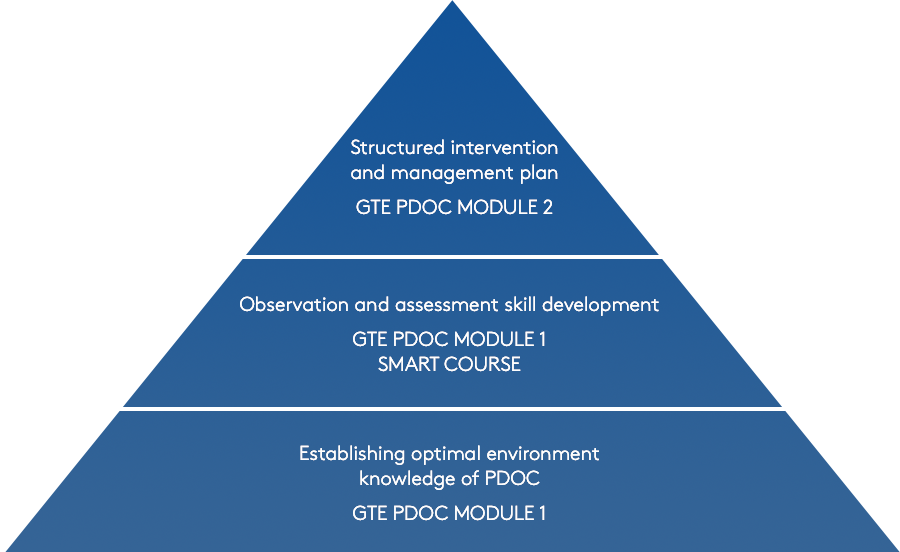Our Services
- Medico-legal assessment/Assessment of awareness
- Bespoke Intervention and management plans
- Monitoring and evaluating Intervention and management plans
- Advisory service
- Education programmes
- LOCCATE

1. Medico-legal assessment/Assessment of awareness
We will undertake a thorough assessment of the individual’s level of awareness using a carefully selected standardised measure such as SMART. SMART-PROFILE Version 3 provides a thorough investigation of the client in a PDOC, providing scope for clinical reasoning by the SMART assessor to explore and enhance responses through the use of standardised and non-standardised assessment sensory techniques. This tool provides extensive information on the individual’s current status in terms of responses to a range of stimuli and also behaviours identified by the team and the family. The outcome of the assessment provides a suggested diagnosis, differentiating between Vegetative State (VS), Minimally Conscious State (MCS) and MCS+ in the lower, mid and upper spectrums, or those showing signs of emergent MCS. This information may be used to identify the individual’s level of awareness and potential ability, to allow case managers, specialist lawyers, and the associated care team to plan future requirements. Additionally, the results can be used to support the expert physician in cases where the withdrawal of artificial nutrition and hydration is being considered. We have undertaken a number of prominent medico-legal assessments and Expert Witness assessments identifying the level of awareness of individuals. These findings have contributed to the court’s decision on the issue of withdrawing artificial nutrition and hydration, and providing direction for future care planning to optimise the quality of life and potential for the individual.
2. Bespoke intervention and management plans
Our consultants are able to work with the family and the care team to provide an individual intervention and/or management plan that will focus on encouraging potential communication and functional movement of individuals who have been diagnosed as being in MCS. We work with the care team to build on the individual’s strengths, identified through assessment as being the most likely aspects to initiate a positive response. We involve the family in undertaking aspects of the programme, if appropriate. The intervention and management plans will enable the MDT and family members to optimise the individual’s environment and potential ability to respond. The sensitive measure of awareness along the diagnostic spectrum will increase awareness of any subtle changes in the individual’s abilities and functional capability.
3. Monitoring intervention and management plans
For those individuals requiring long-term care, further assessments can be completed at set intervals to provide information for formal reviews or if a change in the individual’s awareness has been identified. Advice and educational programmes can also be delivered within the care setting to ensure that changes are monitored and optimum care environments are created. We are keen to involve families throughout the process to gain a full picture of the current and future needs of the individual.
4. Advisory service
Gill-Thwaites & Elliott Consultants Ltd specialises in the assessment, intervention, and management plans of individuals in VS and MCS. We are able to identify the current and on-going client needs for this group of individuals. Through our advisory service, we can discuss your requirements and recommend the most appropriate specialist services for your client/patient or relative. An example of this might be a review of complex/bespoke seating, or an assessment by an expert technological assessor to identify the most appropriate means of communication and/or interaction with the environment. Our consultants can provide advice and/or an assessment to ensure the individual receives the best opportunities and care available. We can also offer supervisory services for those working with PDOC individuals.
5. Education and training packages
We have an extensive range of expertise in the assessment, intervention and management of individuals in VS and MCS, and are able to create learning packages suitable for professionals, support staff and families. In recognition of the requirements identified in the RCP guidelines (2020), for clinicians working with individuals in a PDOC to be appropriately trained, and for families and carers to be suitably informed, we can provide courses that are designed for your needs.
Gill-Thwaites & Elliott PDOC Learning Hierarchy

All Gill-Thwaites & Elliott education and training courses strive to build on existing knowledge, develop understanding of the environment and create reasoned, evidence based and structured intervention. The courses are underpinned by the Gill-Thwaites & Elliott SMART philosophy, to facilitate the best possible opportunity and optimal environment for the individual with a PDOC, to fulfil their potential and receive high quality service provision.
We believe that:
- Skilled intervention is founded on a robust knowledge base and an understanding of the impact of environmental factors
- The care/multi-disciplinary team have a responsibility to provide the optimum environment for the individual to respond and recognise the different types of behaviours observed
- Assessors should be skilled in the recognition and interpretation of behavioural responses and understand the specific nature of assessment of PDOC
- When appropriate, the family should be included in the programme of intervention receiving timely information to support their involvement and decision-making
Through our extensive experience, we have recognised that it is essential that the family, clinical and care teams contribute to the understanding of the individual’s awareness and responses. Careful observation of behaviour and provision of optimal conditions during interventions increases the accuracy of identifying defined behavioural responses and patterns of awareness. We are delighted, therefore, to offer innovative and unique courses in the observation and facilitation of responses in PDOC. We recognise the whole contribution of the team and, consequently, offer courses suitable for professionally trained clinicians and for support staff or families.
i: GTE PDOC MODULE 1
PDOC Observer and Facilitator course
This one-day programme uses the structure of the Gill-Thwaites & Elliott framework to: analyse the principles in creating an optimum environment, discuss the rationale and methods for accurate observation of responses, consider the team and family involvement and examine the role of monitoring and recording responses. The framework provides a series of tools which can be adapted to the delegates’ individual working environments. This course is suitable for MDT and care teams.
Learning and teaching methods: This course is interactive using course facilitator presentations, small and large group work and the opportunity to practise response observation and recording skills using video. The skills gained on this course will additionally enable competent scoring of WHIM assessment and the understanding and skills to contribute to the informal aspects of the SMART.
Course availability
This one-day course is a stand-alone course and can be delivered to teams in the workplace or is available in conjunction with the Royal Hospital for Neuro-disability short course programme. This course also forms the first day of the SMART Assessor course. Please check the Royal Hospital for Neuro-disability website (click here) for delivery format; some courses are delivered via Zoom.
ii. SMART Assessor Course
SMART is recommended as a tool of choice in the Royal College of Physicians (RCP) Guidelines 2020. This 4.5-day training course is for senior neurological clinicians (occupational therapists, physiotherapists, speech and language therapists, clinical psychologists, nurses, and doctors) and will enable the delegate to meet the person specification for PDOC assessors as outlined in the RCP guidelines (2020). The delegate will further develop their skills and knowledge of PDOC and the SMART investigative process, gain skills in the analysis of the investigative process, identifying where the client is currently placed on the diagnostic spectrum and possess the skills to create a bespoke intervention plan.
Following completion of the training, the delegate will be required to complete one clinical SMART assessment, with full support from a mentor, in order to complete the SMART accreditation process. The SMART Manual, Technique Guidebook and all forms are provided free of charge. Re-accreditation is required every four years.
Learning and teaching methods: This course is an intensive programme of interactive lectures, group work and practical sessions. The delegate will apply learning through the completion of the paperwork, data analysis and report template using a fictitious case study. Gill- Thwaites & Elliott will deliver the SMART course in the classroom and work with RHN to provide zoom and modular learning.
Course availability
This is a Gill-Thwaites & Elliott course which is delivered in conjunction with the Royal Hospital for Neuro-disability as part of their education programme. Please check the Royal Hospital for Neuro-disability website (click here) for delivery format; some courses are delivered via Zoom.
Gill-Thwaites & Elliott Consultants can also deliver the course to teams within the workplace in the required format to suit the team.
iii. GTE PDOC MODULE 2
Transforming PDOC assessment results to evidence-based intervention/management strategies, plans and programmes
This one-day course is suitable for clinicians working with individuals in a PDOC. The programme will consider the results of the PDOC assessment and defines what evidence, data and information, underpins a robust intervention and management plan. The necessary clinical strategies and the elements required to create measurable programmes will be explored. The course will demonstrate the practical processes to provide achievable measurable goals, which are graded to frame the interventions. Documentation methods to support decision-making based on the results of the interventions will also be examined in addition to considering how the outcome of interventions can be measured. Exploration of the range of stimuli and technology in conjunction with appropriate adaptation to create purposeful and bespoke programmes is undertaken. Examples will be provided to demonstrate how WHIM scores and SMART profiles can be progressed to measurable intervention and management programmes. This course is suitable for occupational therapists, physiotherapists and speech & language therapists.
Learning and teaching methods: Facilitator presentations, discussion and workshops are undertaken with examples from delegates’ clinical practice. Question and answer sessions to explore clinical issues will be available.
Course availability
This is a Gill-Thwaites & Elliott course which is delivered in conjunction with the Royal Hospital for Neuro-disability as part of their education programme. Please check the Royal Hospital for Neuro-disability website (click here) for delivery format; some courses are delivered via Zoom.
Gill-Thwaites & Elliott Consultants can also deliver the course to teams within the workplace in the required format to suit the team.
6. LOCCATE : A tool to identify the diagnostic spectrum profile of motor and functional communication responses for the individual with a prolonged disorder of consciousness
The levels of consciousness Calibration of Assessment Tools Evaluation is the first tool designed to calibrate the results of any recognised standardised PDOC assessment for patients in Coma, VS, MCS-, MCS plus and emergent MCS. It also categorised the diagnostic spectrum profile for both motor and communicative responses into eight criteria of behaviours. Each criterion has up to three levels of reproducibility, ultimately producing a LOCCATE calibration score ranging from 1 to 27. LOCCATE can be used to identify and record the individual’s responses at any point in time and creates an accurate trajectory to support clinical diagnosis and best – interests and decision making. The LOCCATE manual, summary form and graph are provided.
Click here to download the LOCCATE Manual (PDF)
Click here to download the LOCCATE Form (PDF)
Click here to download the LOCCATE Graph (Excel)
Click here to watch our LOCCATE Webinar
References
LOCCATE: A tool to identify the diagnostic spectrum profile of motor function communication responses for the individual with a prolonged disorder of consciousness, Neuropsychological Rehabilitation
DOI: 10.1080/09602011.2021.1981949